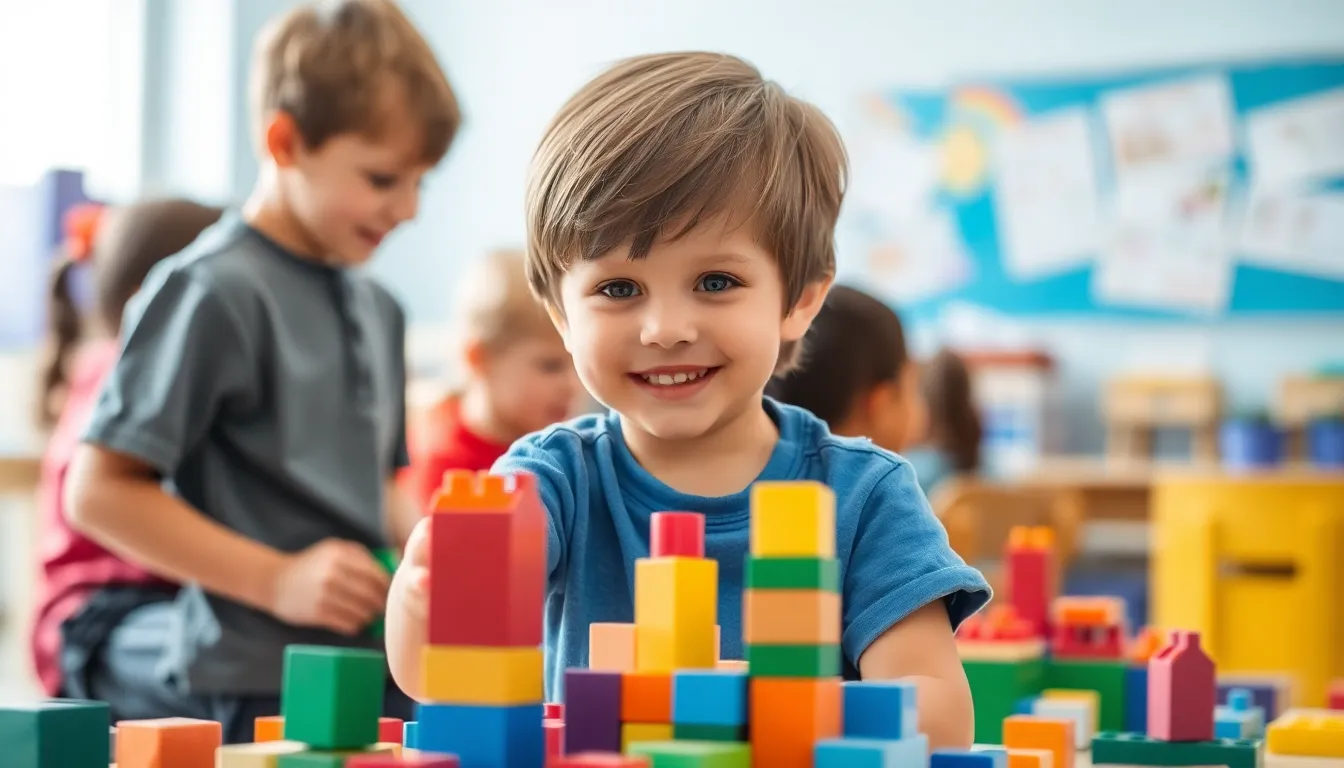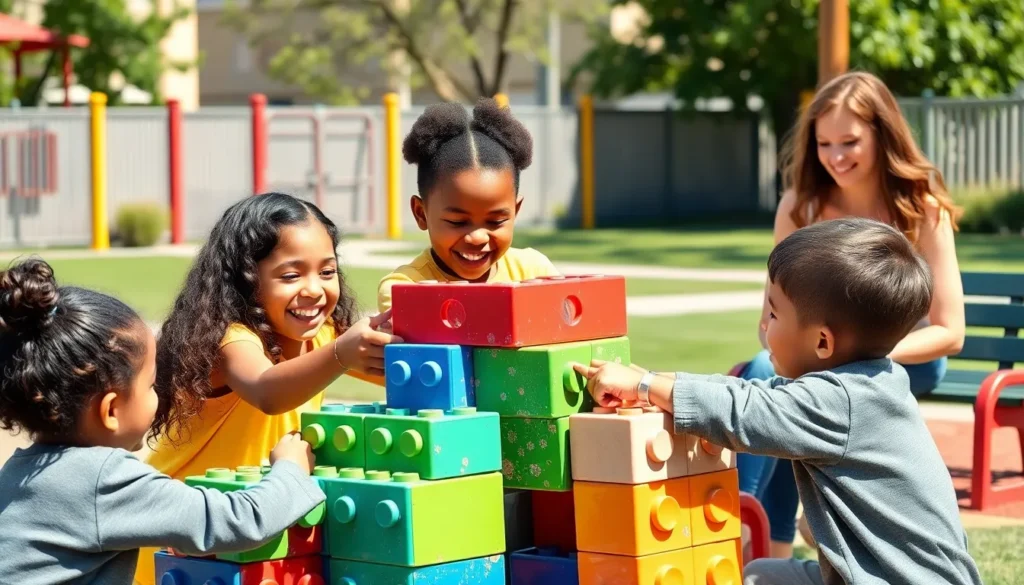As the school bells prepare to ring, the question on every parent’s mind is: Is my child ready? It’s not just about knowing the alphabet or mastering the art of sharing. It’s about emotional resilience, social skills, and the ability to navigate the wild world of lunchroom politics. After all, nobody wants their little one to be the kid who thinks “sharing” means taking someone else’s snack!
Table of Contents
ToggleUnderstanding Readiness For School
Determining school readiness encompasses various factors beyond academics. Emotional, social, and physical development play significant roles in a child’s preparation for school.
Definition of Readiness For School
Readiness for school refers to a child’s holistic preparedness for the demands of a school environment. This includes a child’s ability to engage in learning activities, interact with peers, and manage emotions. It combines cognitive skills with social and emotional competencies, allowing children to adapt to structured settings.
Importance of Readiness For School
Readiness influences a child’s overall success in school. Children who exhibit readiness demonstrate better adjustment to the classroom environment. They also experience increased academic achievement and improved social interactions. The presence of strong readiness skills promotes positive attitudes toward learning, encouraging lifelong educational engagement.
Factors Influencing Readiness For School

Readiness for school involves various factors that shape a child’s preparation. These factors include cognitive development, social and emotional skills, and physical development.
Cognitive Development
Cognitive development plays a significant role in school readiness. Children should demonstrate problem-solving skills, critical thinking abilities, and a basic understanding of numbers and letters. Engaging in age-appropriate activities, such as puzzles or simple games, fosters these skills. With strong cognitive foundations, children adapt better to academic challenges. Research shows that children with advanced cognitive skills often excel in reading and math, directly impacting their future academic success.
Social and Emotional Skills
Social and emotional skills are essential for effective communication and healthy interactions. Children must learn to express feelings, share, and cooperate with others. Being comfortable in group settings helps them navigate school environments successfully. Encouraging playdates or group activities enhances these interactions. Studies indicate that children with strong social and emotional skills experience fewer behavioral issues and tend to have improved academic performance.
Physical Development
Physical development significantly affects a child’s school readiness. Children should achieve basic motor skills, such as running, jumping, and holding a pencil. Fine motor skills, including cutting and drawing, prepare them for writing tasks. Outdoor play and physical activities support this growth. According to experts, children with adequate physical development tend to focus better in class, as they possess higher energy levels and greater stamina for school routines.
Assessing Readiness For School
Assessing a child’s readiness for school involves a comprehensive evaluation of various skills and abilities. Parents should consider both formal and informal methods.
Evaluation Methods
Standardized assessments provide one way to gauge readiness. These tests often measure cognitive abilities and basic knowledge, such as letter recognition and counting. Observations in informal settings offer another effective method. Noticing a child’s interactions during playdates or group activities yields insights into social skills. Teachers’ feedback from pre-kindergarten programs also serves as valuable information. Combining these approaches helps create a clearer picture of the child’s readiness for the academic environment.
Key Indicators of Readiness
Several key indicators signal a child’s readiness for school. Emotional regulation stands out as crucial. Children who manage their emotions adapt better in classroom settings. Additionally, communication skills play a vital role. Effective verbal expression allows children to articulate their needs and ideas. Social skills, such as sharing and taking turns, enhance cooperative play and learning. Lastly, physical development factors into readiness. Basic motor skills, like cutting with scissors and holding a pencil, support classroom tasks. Identifying these indicators enables parents to support their child’s preparation for school effectively.
Supporting Readiness For School
Effective support for school readiness requires collaboration among parents, educators, and community resources.
Role of Parents
Parents play a crucial role in preparing their children for school. They can foster emotional resilience through encouragement and praise. Engaging in conversations about feelings helps children develop emotional intelligence. Daily reading routines introduce foundational literacy skills while boosting vocabulary. In addition, parents should create learning opportunities through interactive play. These activities nurture cognitive and social skills. Establishing consistent routines also aids in improving a child’s sense of security and predictability, which eases the transition to school.
Role of Educators
Educators significantly impact a child’s school readiness. They create inclusive environments that promote social interactions and collaboration among students. Teaching self-regulation fosters independence and responsibility in children. Incorporating play-based learning enhances cognitive and emotional development. Effective communication from educators to parents provides insights into each child’s progress and areas needing support. This partnership strengthens readiness, enabling families to work together with teachers for optimal outcomes.
Community Resources
Community resources enhance support for school readiness beyond home and classroom settings. Local libraries often provide programs that promote literacy and learning for young children. Parenting workshops equip families with valuable skills and strategies, bolstering children’s readiness. Social services may offer developmental screenings, ensuring timely interventions for any delays. Access to recreational facilities encourages physical development through organized activities. These community resources create a comprehensive network that benefits children and families, reinforcing school readiness initiatives.
Determining a child’s readiness for school is a multifaceted process that requires attention to various developmental areas. By focusing on emotional, social, and physical skills alongside cognitive abilities, parents can better prepare their children for the challenges of a school environment. Collaboration among parents, educators, and community resources creates a supportive network that enhances readiness.
Investing time in nurturing these skills not only fosters a positive attitude toward learning but also sets the foundation for future academic success. As children transition into school, a well-rounded approach to their development ensures they’re equipped to thrive in their educational journey. Supporting readiness is an ongoing commitment that pays off in the long run, shaping confident and capable learners.

